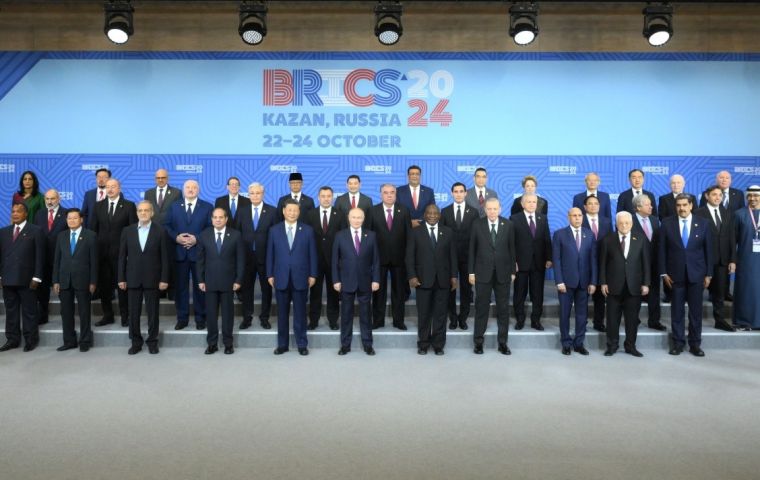MercoPress. South Atlantic News Agency
Venezuela angry at Brazil for BRICS exclusion while Bolivia and Cuba were admitted
 Also granted BRICS associate member status were Algeria, Belarus, Indonesia, Kazakhstan, Malaysia, Nigeria, Thailand, Turkey, Uganda, Uzbekistan, and Vietnam
Also granted BRICS associate member status were Algeria, Belarus, Indonesia, Kazakhstan, Malaysia, Nigeria, Thailand, Turkey, Uganda, Uzbekistan, and Vietnam While Cuba and Bolivia were accepted into the BRICS bloc as associate states, the Bolivarian regimen of President Nicolás Maduro blamed Brazil for Venezuela's exclusion.
The Chavista Government spoke of an “aggression” from the Luiz Inácio Lula da Silva administration and claimed that South America's largest country had vetoed the Caribbean country's entry. In response, Itamaraty argued that the group only defined the criteria and principles for new members during this week's summit in Kazan, Russia, Agencia Brasil reported.
”The Venezuelan people feel indignation and shame at this inexplicable and immoral aggression by Brazilian diplomacy (Itamaraty), maintaining the worst of Jair Bolsonaro's policies against the Bolivarian Revolution founded by Commander Hugo Chávez,” the Venezuelan Foreign Ministry said in a statement.
Following a consensus between the ten BRICS member countries, Russia agreed to invite 13 countries to join the organization as associate members.
Brazil has been diplomatically distancing itself from Venezuela after the July 28 elections Maduro allegedly won, although the opposition, international organizations, and various countries, have expressed their doubts about the credibility of those results after the National Electoral Council (CNE) failed to produce the voting minutes of each polling station attesting to that assessment. In addition, the Unitarian Democratic Platform (PUD) published 83% of those documents endorsing Edmundo González Urrutia's victory. Notwithstanding, González Urrutia was forced to seek asylum in Spain when an arrest warrant against him was issued. Maduro is interested in joining the BRICS and participated in this week's Summit.
“I sincerely hope that Brazil and Venezuela will resolve their bilateral relations during the bilateral discussion. I know President Lula to be a very decent and honest person and I am sure that he will approach this situation from an objective position. And he asked me to pass on a few words to the President of Venezuela during our telephone conversation. I hope the situation improves,” said Russian President Vladimir Putin.
He added that the inclusion of new countries only takes place by consensus of the group's full members.
Itamaraty explained that it is not advocating the inclusion or exclusion of any given country, but merely advocated the creation of criteria and principles to guide the choice of new BRICS members. According to Brazil's Secretary for Asia and the Pacific at the Foreign Ministry, Ambassador Eduardo Paes Saboia, the criteria include defending a United Nations reform, not accepting unilateral economic sanctions, and having friendly relations with all the member countries.
“Cuba is honored to enter as a partner country in the BRICS, five letters and a great hope for the countries of the South, in the arduous path towards a more just, democratic, equitable and sustainable international order,” Cuban President Miguel Diaz-Canel wrote on X after his country's admission into the bloc.
After meeting with Putin in Kazan, Bolivian President Luis Arce Catacora highlighted the current cooperation between the two countries in various fields, including political, economic, commercial, educational, and cultural. He also asked Putin whether Bolivia's associate membership status would mean a step toward full membership.
Also granted the new condition within BRICS were Algeria, Belarus, Indonesia, Kazakhstan, Malaysia, Nigeria, Thailand, Turkey, Uganda, Uzbekistan, and Vietnam. The bloc initially made up of Brazil, Russia, India, China, and South Africa, was extended with the entry of Saudi Arabia, Egypt, the United Arab Emirates, Ethiopia, and Iran on Jan. 1, 2024. Thus, the group now represents almost half the world's population, 40% of global oil production, and around 25% of goods exports. Argentina was also to have joined on Jan. 1 following the diplomatic efforts of former President Alberto Fernández. However, the Libertarian administration of Javier Milei declined the possibility after being inaugurated on Dec. 10, 2023.




Top Comments
Disclaimer & comment rules-

-

-

Read all commentsWell after this kind of behavior, I can see why I even Lulu is miffed at Nick the Mad...
Oct 26th, 2024 - 01:35 am +1https://www.reuters.com/world/americas/venezuela-opposition-party-says-local-leader-state-custody-found-dead-2024-10-25/
I hope that Brazil will reconsider and invite Venezuela to join the BRICS now in 2025 when Brazil itself will hold the rotating presidency.
Oct 26th, 2024 - 10:09 am 0https://www.youtube.com/watch?v=E6Ndg4pvLh8&list=FLmXPTu1f8AdGlizWNiASx2A&index=7
Of course you do, Brasso, you yourself have ambitions to be able to torture and murder anyone you disagree with. Good luck with that, monster...
Oct 26th, 2024 - 05:00 pm 0Commenting for this story is now closed.
If you have a Facebook account, become a fan and comment on our Facebook Page!